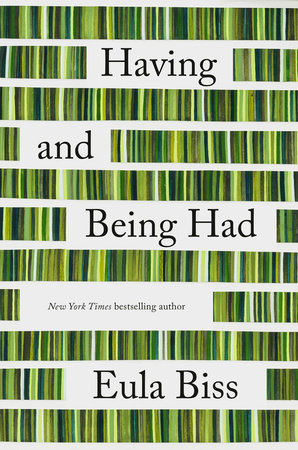Having and Being Had
Eula Biss
(Faber & Faber, 2019), hbk; £15.99
In 2014, essayist Eula Biss took out a mortgage with her husband on a two-bedroom bungalow in Chicago. The experience made her uneasy.
“I knew from past experience that the discomfort would fade and that my extraordinary new life would become ordinary with time. To stave off that loss, I kept a dairy in which I recorded moments of discomfort from my life, usually moments in which I was also enjoying some sort of comfort or pleasure . . This book is what came of that contradiction. . . At first, every moment I recorded was excruciating to me, but it was also beautiful.”
On the first page of Having and Being Had, Biss describes how a Mexican woman accompanied by four children, on seeing the front room of the bungalow was curtainless and empty, enquired if the room was available to rent. A moment of intense discomfort.
Biss has never shied away from difficult subjects or from writing about personal experience. Notes from No Man’s Land (2009) examined race and racism through the lens of her own white identity, On Immunity (2014) examined her response as a new mother to the subject of vaccinations. Having and being Had tackles capitalism, consumption, property, and privilege, with observations along the way about the relationship between art and the nature of ‘work.’ The age-old conundrum of how an artist can fulfil their need to make art, with the need for that art to provide an income.
Biss wrote the book with a fixed set of rules, one of which was to name specific sums whenever she mentioned money. We discover how much she earns, the cost of her house, how much she pays her childminder and cleaner. Talking about money is often a difficult subject to broach, and it was uncomfortable to read about her finances, which raised questions in my mind – why don’t we talk about money, and who benefits from this silence? Like many aspects of the book Biss raises questions but doesn’t prescribe answers or solutions.
Written in a conversational style, she thinks through her life in a series of vignettes, unpicking the contradictions in minute detail. Written in the present tense – another rule – the language is active, kinaesthetic, born out of physical and sensory experiences:
The pleasure of splitting a log, I know, is not unlike the pleasure of hitting the right sentence, a sentence that splits open to reveal a meaning that was, just moments ago, trapped in wood.
The book is well-researched – she read widely, including Marx, references essayists like Joan Didion and Virginia Woolf, and she talked to leading thinkers, friends, and economists in a quest to define ‘class’ and capitalism. Biss discovers that by buying a house she has bought into a new game, dependent on keeping her job, on making decisions about investments and pensions. A game that involves buying furniture and furnishings, maintaining her home and garden:
I don’t like trimming hedges . . . Maintenance is the tax I pay on this life, I think. And that is why I want to do it by hand, with heavy shears.
It’s the quieter observational moments in the book that are the most striking illustrations of how consumer capitalism works, how it shapes our everyday lives around us, often hidden in plain sight. Biss’s son trades Pokémon cards at school and the children argue about their value, the cards are only worth what others will pay for them. As they work out their own value system, some cards are valued for being shiny, some prized for their rarity, and a younger child, unversed in the game, trades all his cards for a single card.
Biss’s razor-shape gaze is formidable, touching, and humane. The book engenders discomfort, but there is comfort in the renaissance of ‘essaying’ as an increasingly viable commercial genre, which creates opportunities to converse, examine and generate new ways of thinking.
Jane Swanson


Leave a Reply